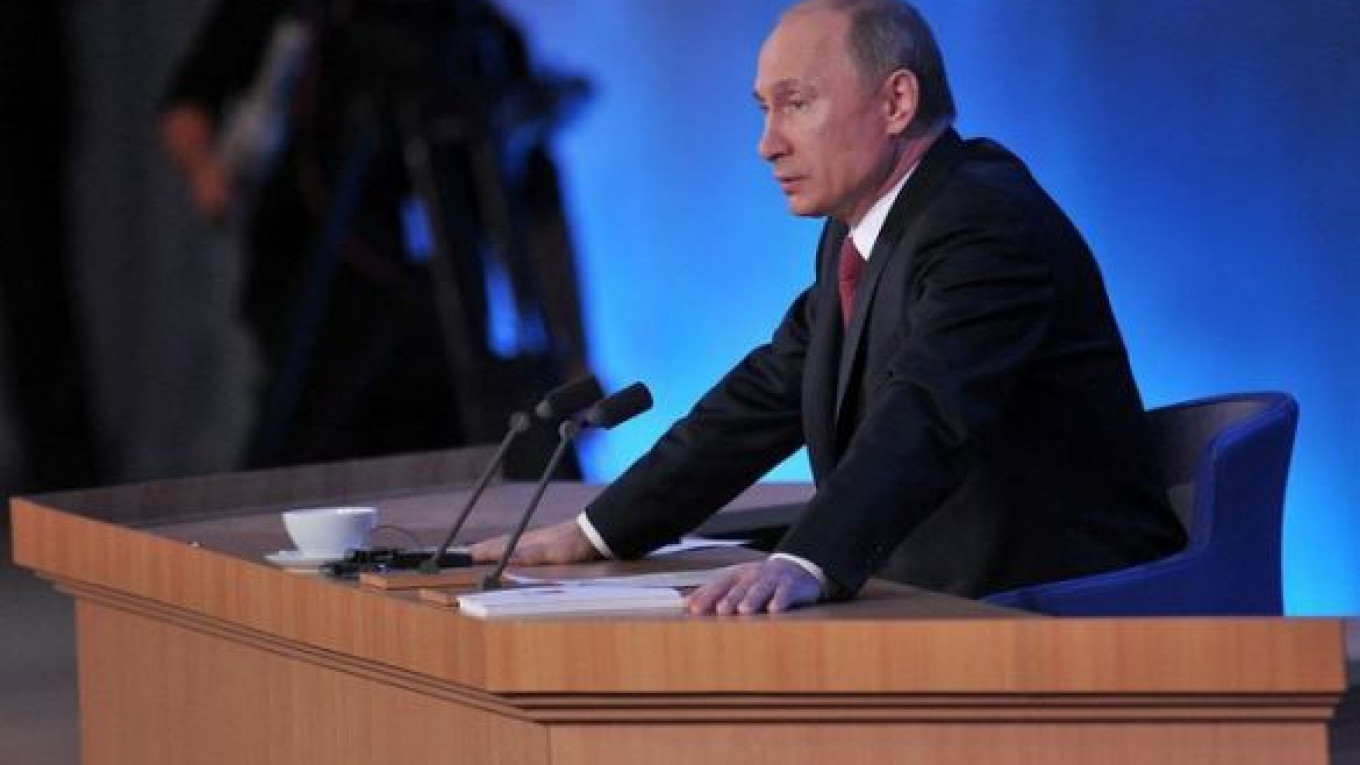President Vladimir Putin on Thursday called for the billionaire owners of the Alfa-Access-Renova consortium to invest the $28 billion cash they will get from selling their 50 percent stake in TNK-BP locally.
“I would very much like them to invest this money, or a significant portion of it, in the Russian economy,” Putin told reporters during his marathon news conference.
However, he made it clear that the consortium members are free to decide how to use the proceeds from the deal without any pressure from the Kremlin.
“If we admitted that it is a legitimate owner, that they received the money legally, it's still up to them to decide where to invest,” Putin said, adding that the parties involved in the deal are in regular contact with government officials.
A source close to AAR, who declined to be identified because he wasn't authorized to talk to the media, said each of the consortium's companies makes its strategic business decisions independently and will decide individually how to invest the proceeds from the deal.
The cash from the sale of the stake in TNK-BP to state oil behemoth Rosneft will be distributed among the three consortium members, with Access and Renova each getting $7 billion, while Alfa Group will get $14 billion, the source said.
"The president's comments are unlikely to result in Renova changing its investment strategy," said company spokesman Andrei Shtorkh.
"We make the largest portion of our investment in Russia and will continue to do so," he said, adding that the diversified company, owned by billionaire Viktor Vekselberg, plans to gradually reduce spending on oil and gas projects to increase investment in the technology sector.
Rosneft sealed a $61 billion deal in October to buy 100 percent of TNK-BP from BP and the AAR consortium of companies, owned by Soviet-born tycoons Vekselberg, Mikhail Fridman, German Khan and? Len Blavatnik.
The $28 billion to be received by AAR will be transferred to the consortium's offshore entities.
For those funds to be repatriated to Russia, the government should create favorable conditions for doing business, Putin said. The remark followed the announcement about “deoffshorization” of the country's economy he made during the state-of-the-nation address last week.
During Thursday's news conference, Putin called for “accurate, civilized ways” to force offshore zones to disclose tax information and information about companies' ultimate beneficiaries.
He called the practice of European countries signing agreements with tax havens “a rather civilized measure.”
“There's nothing to fear here,” Putin said. He reiterated that it’s also necessary to improve legislation and the investment climate.
In later comments, he said Russia's accession to the World Trade Organization was? critical to making the country more attractive for investors.
“For a potential foreign investor, it's very important to know that a country is a WTO member,” he said.
"Despite acknowledging that joining the global trade club poses risks to some of the country's industries — like auto manufacturing, agriculture and agricultural-equipment manufacturing" — Putin said the move is, in general, beneficial for Russia.
“There are more pluses than minuses,” he said. “The WTO has many tools, which are actively used by its members to protect their interests. And we too must learn how to do it.”
The president also promised that Russia would lift the ban on importing Georgian wine and mineral water if doing so is required by WTO rules. The ban was introduced in 2006 amid a surge of political tension between Russia and Georgia.
Since Georgia, which was blocking Russia's accession to the trade organization, withdrew its objections, “we must be logical and fulfill our obligations,” he said in answer to a question from Georgian journalist David Akhvlediani about opening Russia's market to the Georgian goods.
Following Akhvlediani's remarks that he had brought some local wine to Moscow, Putin asked whether he could have a glass.
“Wine is delicious in Georgia, I have to admit,” Russia’s president said.
Putin also touched on the problem of gas cooperation with Ukraine, saying the Ukrainian authorities had made “a strategic mistake” when they rejected a proposal by Russia and its European partners to rent the country's gas transportation system.
“All that has happened in recent years, including a well-known scandal in 2009, motivated Russia to boost our infrastructure projects,” he said, referring to the dispute over gas supplies that broke out between Russia and Ukraine in late 2008 and early 2009.
Management of Ukraine's gas transportation system was a sticking point in the two countries' gas talks at that time. In exchange for lowering gas prices for Ukraine, Gazprom was pushing for control over the pipeline that ensured supplies of Russian gas to Europe through Ukraine.
Putin doubted the “feasibility of Ukraine's gas transportation system,” given that Russia is developing projects to supply gas to Europe bypassing Ukraine. But he said the Kremlin is still ready to discuss the option to rent Ukraine's pipeline.
Related articles:
A Message from The Moscow Times:
Dear readers,
We are facing unprecedented challenges. Russia's Prosecutor General's Office has designated The Moscow Times as an "undesirable" organization, criminalizing our work and putting our staff at risk of prosecution. This follows our earlier unjust labeling as a "foreign agent."
These actions are direct attempts to silence independent journalism in Russia. The authorities claim our work "discredits the decisions of the Russian leadership." We see things differently: we strive to provide accurate, unbiased reporting on Russia.
We, the journalists of The Moscow Times, refuse to be silenced. But to continue our work, we need your help.
Your support, no matter how small, makes a world of difference. If you can, please support us monthly starting from just $2. It's quick to set up, and every contribution makes a significant impact.
By supporting The Moscow Times, you're defending open, independent journalism in the face of repression. Thank you for standing with us.
Remind me later.


